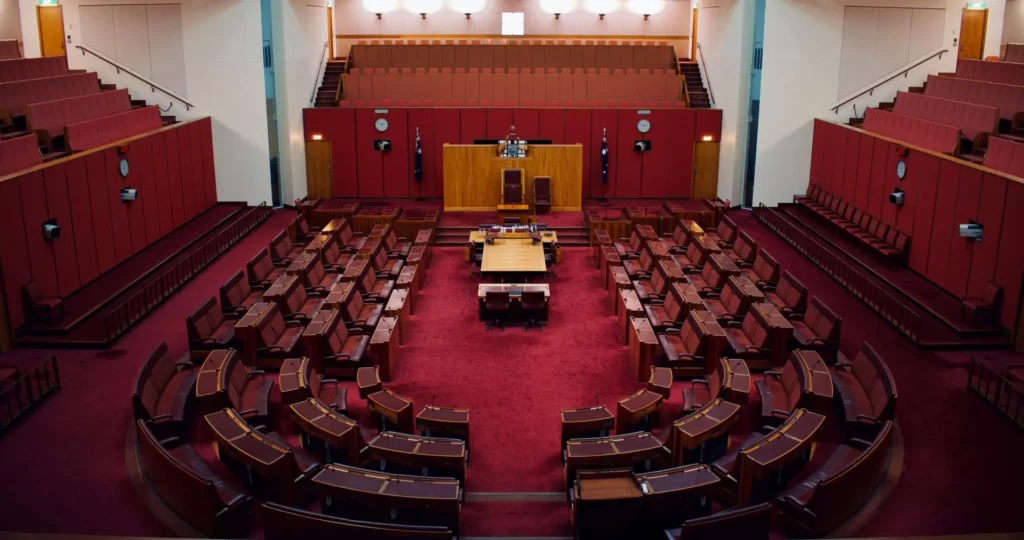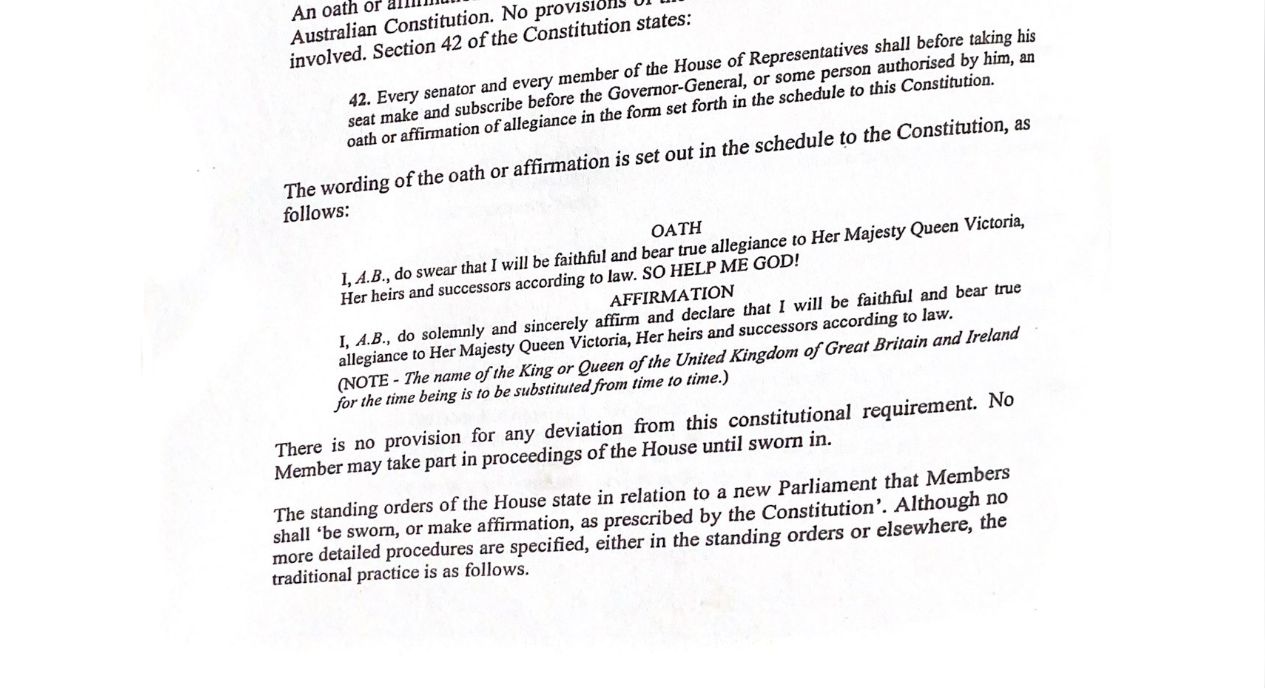Constitution series: Covering Clause 1
Covering Clause 1
Short Title
- 1. This Act may be cited as the Commonwealth of Australia Constitution Act.
The Annotated Constitution written by Quick and Garran make the following comments; Page 310 and 314, (relevant part only).
Historical note.
Clause 1 of the draft Bill framed by the Sydney Convention of 1891, and usually known as The Commonwealth Bill of 1891 (which became the Constitution Act 1900), declared that- “This Act shall be cited as The Constitution of the Commonwealth of Australia Act .
Some aditional notes.
The words “the draft Bill framed by the Sydney Convention of 1891, and usually known as The Commonwealth Bill of 1891” point out the influence that Australia had in the creation of the Constitution Act.
The words “Sydney Convention of 1891” was one of the Constitutional Convention Debates and that the framers of the Commonwealth Constitution had all around the Country and used those Constitutional Convention Debates to formulate such Constitution.
The Annotated Constitution written by Quick and Garran make the following comments; Page 310 and 314, (relevant part only).
This Act.
Outline of the Act.
This Act, to constitute the Commonwealth, consists of nine clauses.
Clause 1 gives the short title of the Act;
Clause 2 declares that it binds the Crown and extends to the Queen’s successors;
Clause 3 provides that the Queen may issue a proclamation appointing a day when the people of the federating colonies shall be united in a Federal Commonwealth;
Clause 4 specifies when the Commonwealth is to be deemed legally established;
Clause 5 provides for the legal operation of the Act and of the laws of the Commonwealth;
Clause 6 defines “Commonwealth,” “States,” and “Original State;”
Clause 7 repeals the Federal Council Act, 1885;
Clause 8 applies the “Colonial Boundaries Act, 1895,” to the Commonwealth;
Clause 9 contains the Constitution of the Commonwealth.-
Commonwealth.
Significance of the term.
The Annotated Constitution written by Quick and Garran make the following comments
The term “Commonwealth,” to label the Australian colonies, united in a Federal Constitution, was first proposed by the Constitutional Committee of the Federal Convention held in Sydney in 1891. The suggestion was eventually adopted, by a substantial majority of votes. The same name was accepted by the Federal Convention of 1897. In both Conventions the name Commonwealth was generally accepted, the only objections raised to it being that it was suggestive of republicanism, owing to its association with the Commonwealth of England.
According to the derivation of the term from “common” and “wealth” it signified common wellbeing or common good.
Webster says “a Commonwealth is a State consisting of a certain number of men united by compact, or unspoken agreement under one form of government and one system of laws. Strictly, it means a government in which the general welfare is regarded rather than the welfare of any particular class. In this Act the word is used to describe the new political community created by the union of the people and of the colonies of Australia.
Constitution.
Definition.
The Annotated Constitution written by Quick and Garran make the following comments; Page 314 and 316, (relevant part only).
A Constitution is a general law for the government of a political community, unamendable and unrepealable, except in the manner and on compliance with the conditions prescribed by the authority which created it.
A general law first, then, a Constitution is a general law or a collection of laws, capable of effective enforcement and binding on every member of the community, including the members of the Government in their private capacities.
It is a law which should be understood in wide and general terms, avoiding tiny specifications and details and thus leaving room for “unpredictable emergencies,” and possible and desirable developments. In the history of a Constitution there grow in association with it, and springing from its certain customs and practices, which cannot be exactly termed laws, strictly so called. These customs and practices generally relate to matters which, by the letter of the Constitution, are left to the discretion of some member or branch of the sovereign body.
In time, owing to political influences and considerations, these discretionary powers are exercised in a certain manner; and hence arise what have been described as the understandings and conventions of the Constitution, different from the positive law of the Constitution.
Some additional notes.
The words:- “leaving room for unpredictable emergencies, and possible and desirable developments” and the words “understandings and conventions” Is an area that has been exploited. The framers of the Constitution, have left such Constitution, and consequently the people, somewhat exposed. In other words, the framers of the Constitution did not think that our elected representatives would enslave and control the people in such a Fascist manner as we have since the early 1930s. (8 Decades)
What is fascism?
Fascism is corporatism and is a totalitarian or dictatorial form of control. It is also an extreme right wing or new world order type of governance and almost totally Governs for the Corporations and not the people.
The Annotated Constitution written by Quick and Garran make the following comments; Page 314 and 316, (relevant part only).
As distinct from a Constitution, a law implies the existence of a force able to command obedience and to punish disobedience. As such, a law is clearly contrasted with a mere understanding, or a practice, which is capable of variation and modification. A Constitution is also different from a social compact between the members of the society which it concerns; if it were a mere compact it could be rejected and violated at the whim of any faction or group within the society.
When the functions of government are divided, there must be some more specific rules appropriating certain classes of work to particular members of the governing body, determining the mode of appointment and succession of those members, such as Legislators, and Judges.
These rules would, if compiled and classified, compose a more complex constitution, and so the greater the division, and multiplication of governing agencies, and the greater the distribution of power, the more complex a constitution becomes.
Governing power, as well as subordinate or delegated governing power, analysed and classified, may be resolved into three departments or divisions—
- The making and promulgation of laws prescribing the functions of governing agencies and regulating the legal rights and duties of the people within the jurisdiction of the government (Parliament):
- the administration (Executive); and
- the interpretation and determination of laws in cases where doubts arise as to their meaning or intention (Judiciary).
In simple societies these three functions may be blended in one person, or one body, but in all maturely developed States they become segregated, and divided amongst separate persons or separate bodies composing the sovereign authority as a whole.
Hence arises the well-known tripartite division of government into the Legislative Department, the Executive Department, and the Judiciary Department.
The British system of government, the Constitution of which, although it has not been reduced to the form of a single document or Act of Parliament, is as capable of being gathered from numerous Charters, Bills, Proclamations, Statutes, legal decisions, and official documents, extending from the time of King Alfred down to the reign of Queen Victoria (Now Queen Elizabeth ll), as the Constitutions of the countries referred to, which have been, in fact, largely constructed according to the British model.
This tripartite classification does not necessarily imply that each of the three departments of government is independent of the others. Each of the three is endowed with a defined share in the work of government, but they are all parts of one governing machine and are exercising portions of the sovereign power; each acts within its respective legal sphere, but, to some extent, one may check and balance the other. The Executive may advise the legislature, as is done in the British system.
Although the primary appointment of the Judges generally rests with the Executive, and for gross misconduct in office they may be removed by the Executive: in some Constitutions they may be removed by the Executive at the request of the Legislature.
In every well-designed Constitution the Judiciary, once appointed, is almost absolutely independent of the influence of either the Executive or the Legislature;
Rights, privileges and immunities.
A Constitution not only deals with this division of governing powers, with the mode in which those powers are exercised, and with the structure of the governing organs; it generally details certain cardinal rules, principles, and maxims which are intended to be the public policy that should guide or bind the Executive the Legislature, and the Judiciary Departments.
Thus Magna Charta, the Petition of Rights, and the Bill of Rights, contain declarations of rights, privileges, and immunities, which are said to be the inalienable birthright and heritage of every British subject, protecting his liberty from unlawful impairment and his property (Fee Simple) from spoliation. (De facto Taking)
These declarations undoubtedly bind the British Executive and the British Judiciary; they may guide but cannot bind the British Parliament, which may amend or repeal them at any time, but only with a super majority (around 80% of those entitled to vote, voting in favour).
A fundamental law.
Next, the word Constitution means the idea of a fundamental law—a law of higher authority, than ordinary legislation. In all modern written Constitutions there is a tendency to establish the fundamental character of the instrument upon a firm legal basis by making the process of constitutional amendment more difficult and more complex than the process of ordinary legislation (except in Victoria), and thus to affirm the principle that every alteration in the fundamental law is an act so momentous that it requires compliance with special formalities intended to prevent hasty and ill-advised changes, to ensure the fullest debate, to guard against surprises, and to protect the rights and interests of all classes of the community (again except in Victoria).
A Constitution which makes the process of its own amendment more difficult than the process of ordinary legislation is what is called a “rigid” Constitution.
The degree of rigidity may vary widely; it may consist of the unusual majorities in the Legislature (control of both houses of Parliament) or the constraints, set out by conventions, or the constraints set out by the requirement for elector approval, or it may involve other and more complicated processes.
Black’s Law 9th Edition.
Spoliation.
- The intentional destruction, mutilation, alteration, or concealment of evidence.
- The seizure of personal or real property by violent means; the act of pillaging.
- The taking of a benefit, properly belonging to another.
Take.
To obtain possession or control, whether legally or illegally. It’s a felony to take that property without the owner’s consent.
To acquire (property) for public use by eminent domain; (of a governmental entity) to seize or condemn property. The state took the land under its eminent-domain powers.
Taking.
Constitutional law. The government’s actual or effective acquisition of private property either by ousting the owner or by destroying the property or severely impairing its utility. – There is a taking of property when government action directly interferes with or substantially disturbs the owner’s use and enjoyment of the property.
De facto taking (1921)
- Interference with the use or value or marketability of land in anticipation of condemnation, depriving the owner of reasonable use and thereby triggering the obligation to pay just compensation.
- A taking in which an entity clothed with eminent-domain power substantially interferes with an owner’s use, possession, or enjoyment of property.
Eminent domain.
The inherent power of a governmental entity to take privately owned property, esp. land, and convert it to public use, subject to reasonable compensation for the taking.
“The term ’eminent domain’ is said to have originated with Grotius, the seventeenth century legal scholar. Grotius believed that the state possessed the power to take or destroy property for the benefit of the social unit, but he believed that when the state so acted, it was obligated to compensate the injured property owner for his losses. Blackstone, too, believed that society had no general power to take the private property of landowners, except on the payment of a reasonable price.
Fee Simple.
(1289 to 1290 and is an Entrenched Law)
Hailsbury’s Laws of England, 1st Edition, Volume XXLV (24) Page 164 to 173.
Explanatory or supporting argument has not been included.
Estates and Interests in Real Estate at Common Law.
Section 1.– Estate in Fee Simple. Sub Section 1,-Quantum of Estate.
Sub Section 2,-Incidents of Estate.
(i) Enjoyment.
317 Land subject to easements or to restrictive covenants cannot be used in a manner inconsistent with the proper enjoyment of the easements, or with the due observance of the covenants; and, in certain circumstances, the use of land may interfere to such an extent with the comfort of neighbouring owners or occupiers as to constitute an actionable nuisance; but, short of this, an owner in fee simple is subject to no restrictions as to the use to which he may put the land, and he may exercise over it acts of ownership of all kinds, including the commission of waste, such as the felling of timber, opening and working of mines, and the pulling down of houses. If, however, his estate is subject to an executor device over, he is in the same position as a tenant for life without impeachment of waste; he may not commit equitable waste.
Sub Section 3.- Incidents of Estates.
327 There is no rule forbidding waste by the owner of an estate in fee simple which is liable to be determined for breach of condition or by virtue of a collateral limitation. Consequently, such an owner has the same rights of actual enjoyment as an owner in absolute fee simple, including the right to commit waste at his pleasure.
Credit: (CLRA) Community Law Resource Association
Authorised by Ian Nelson for the Great Australian Party, 65 Cardinal Cct, Caboolture, 4510


